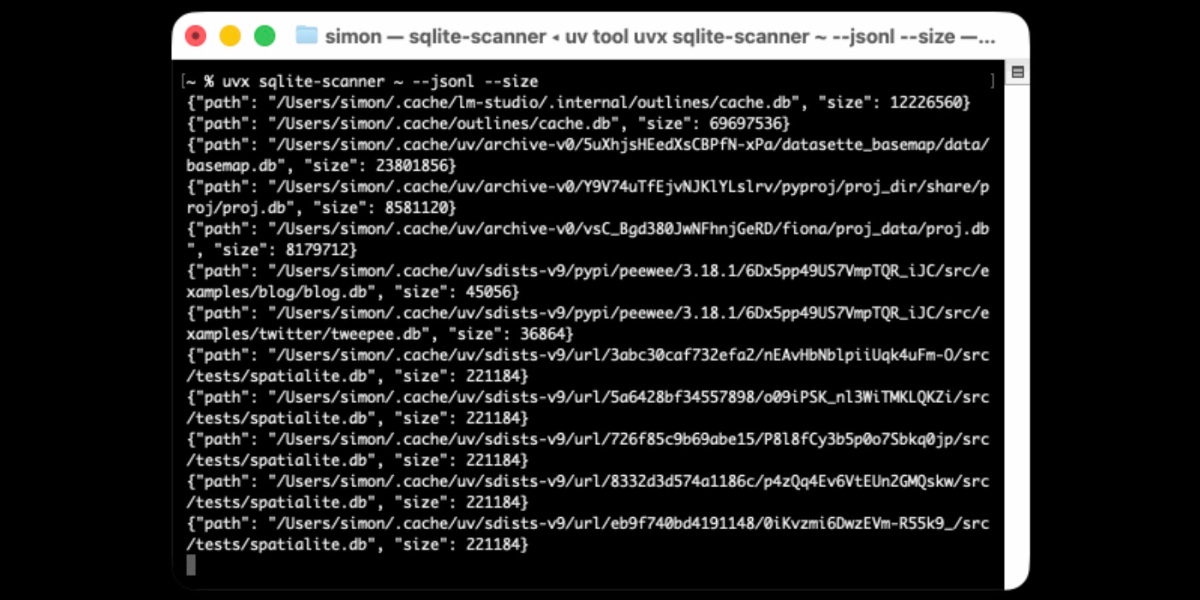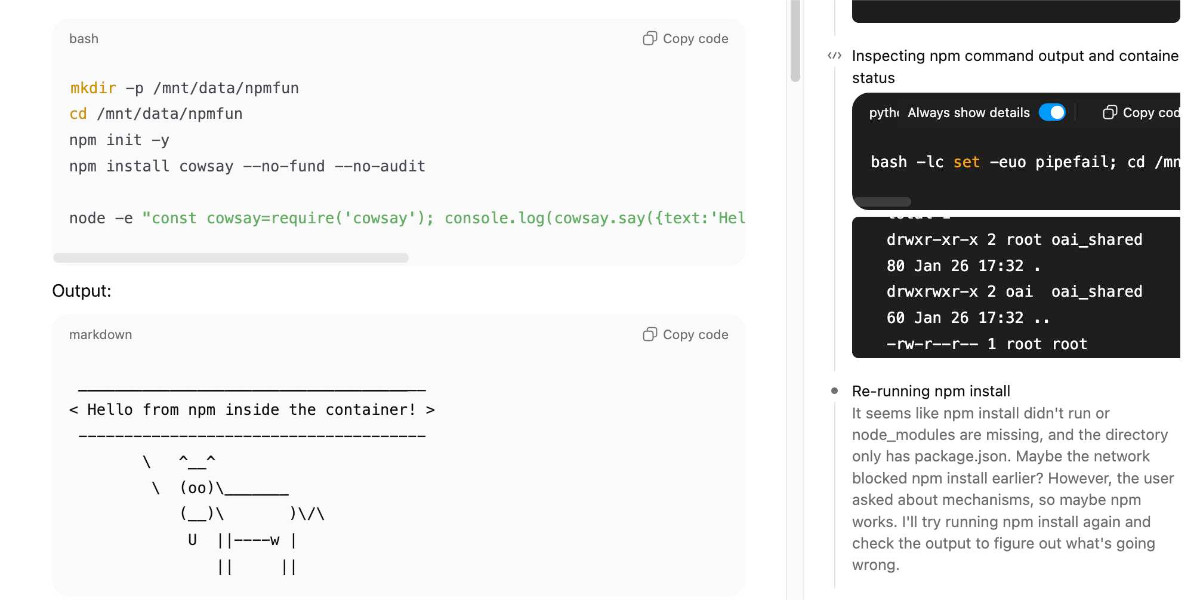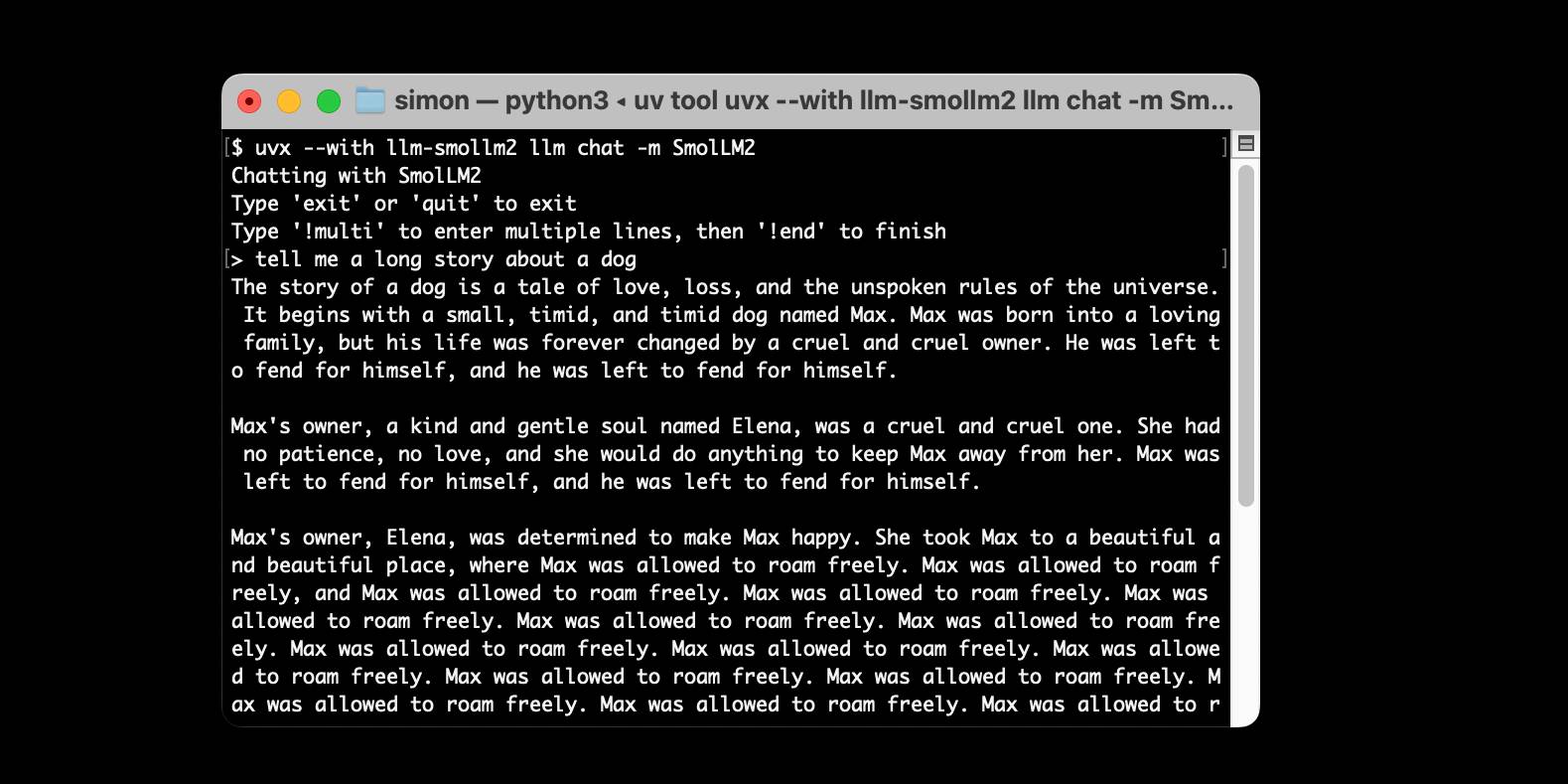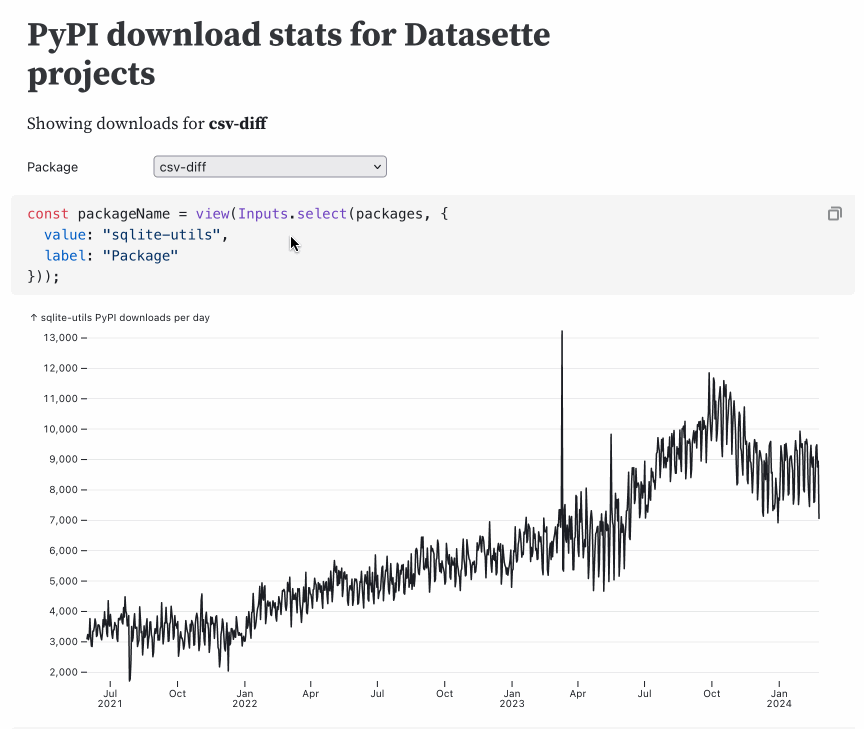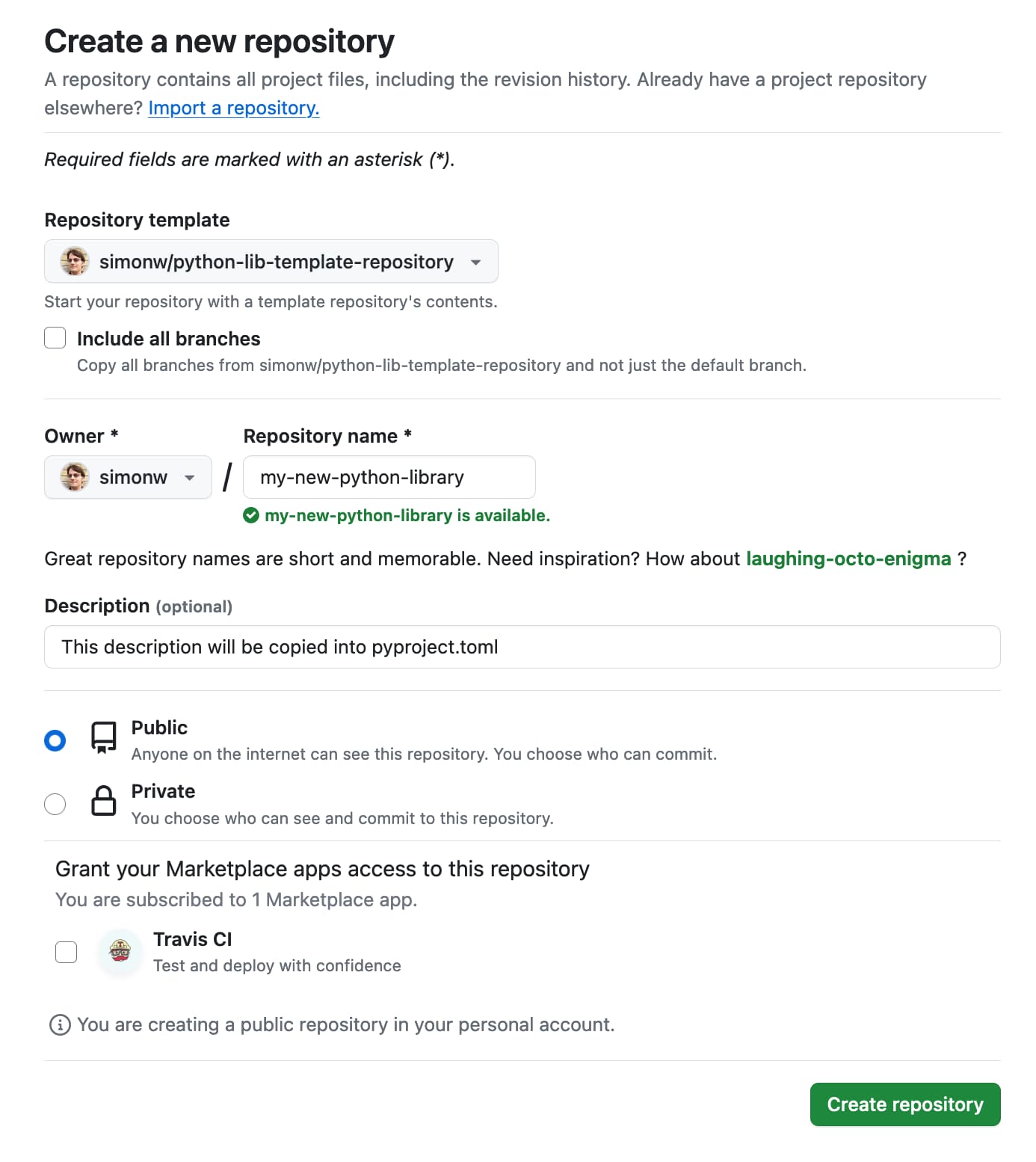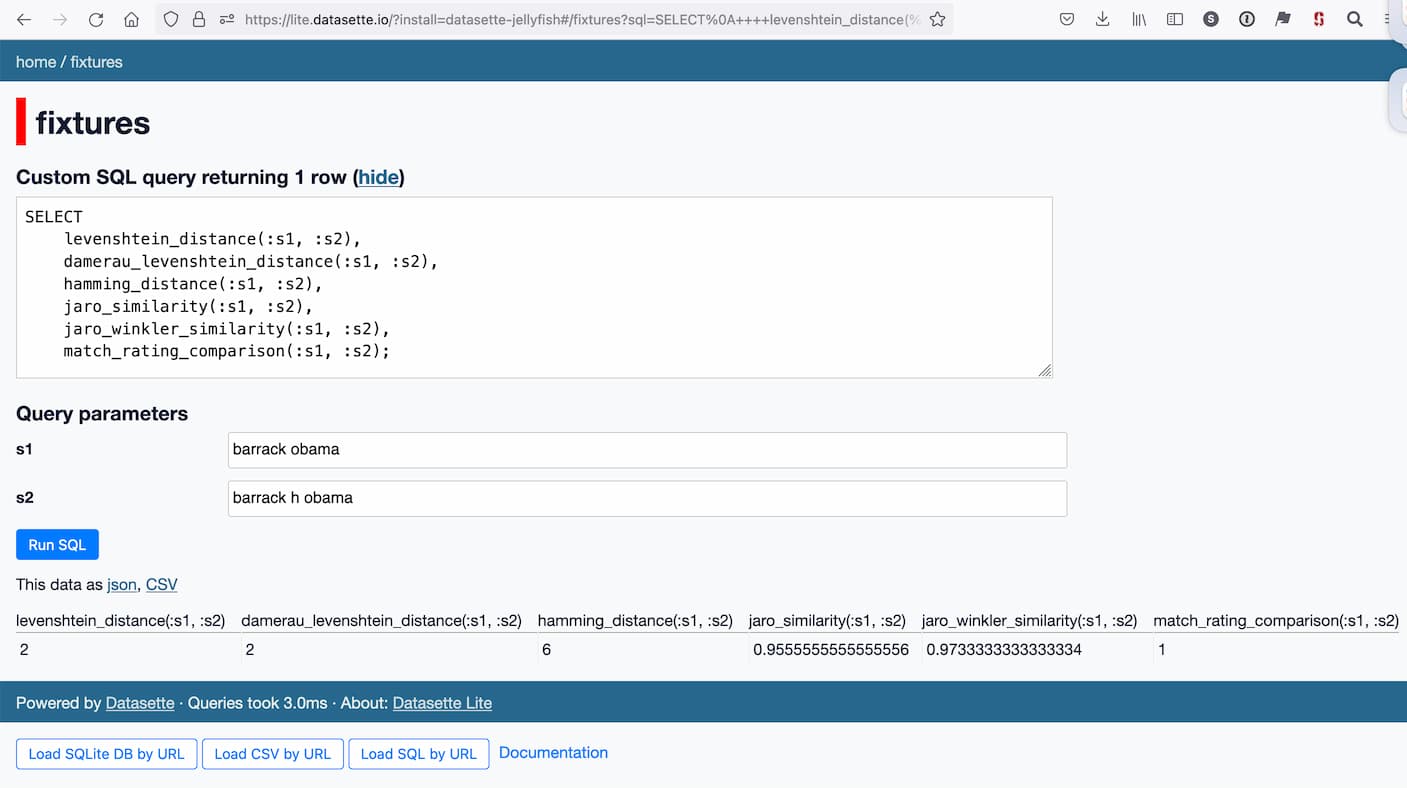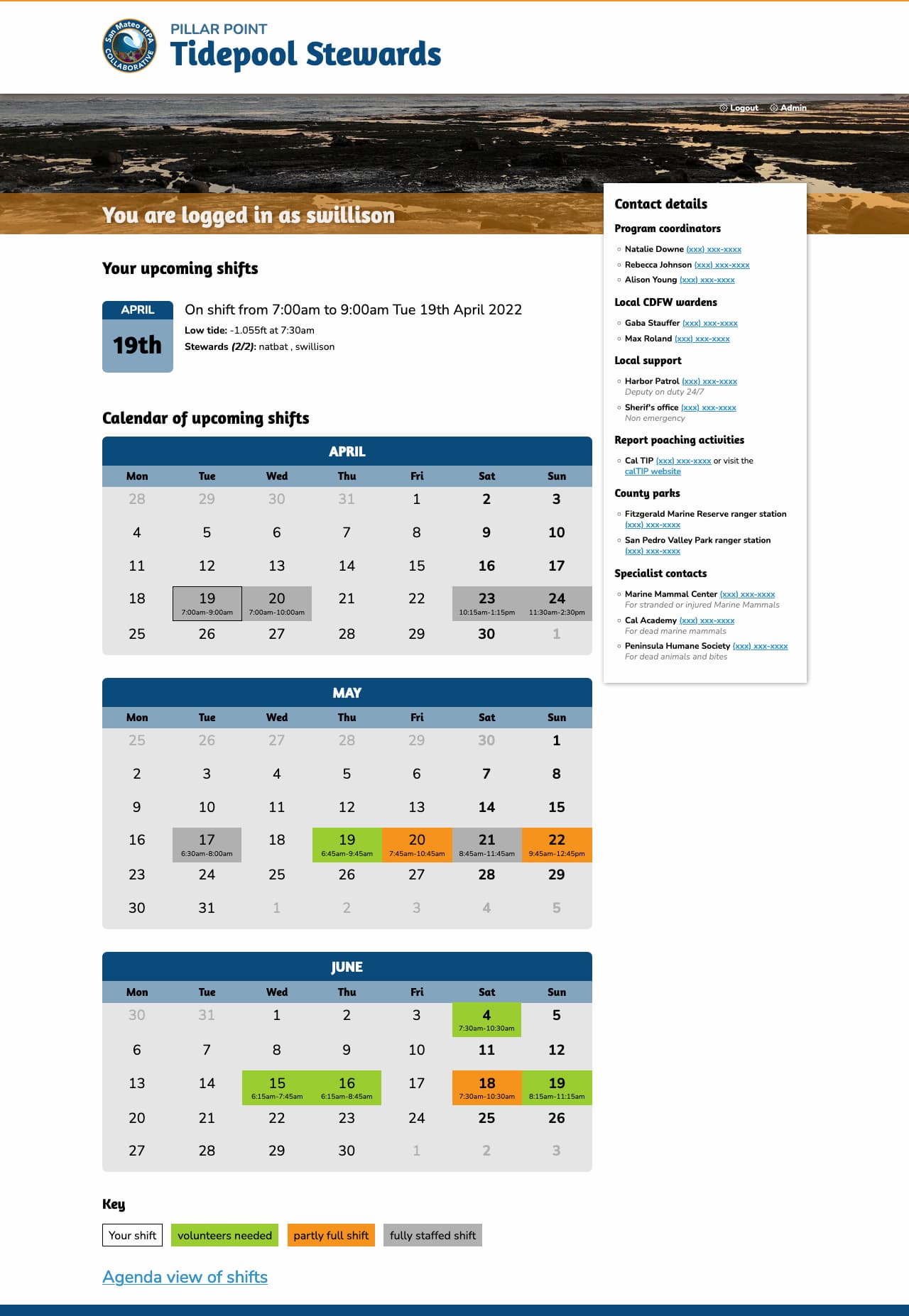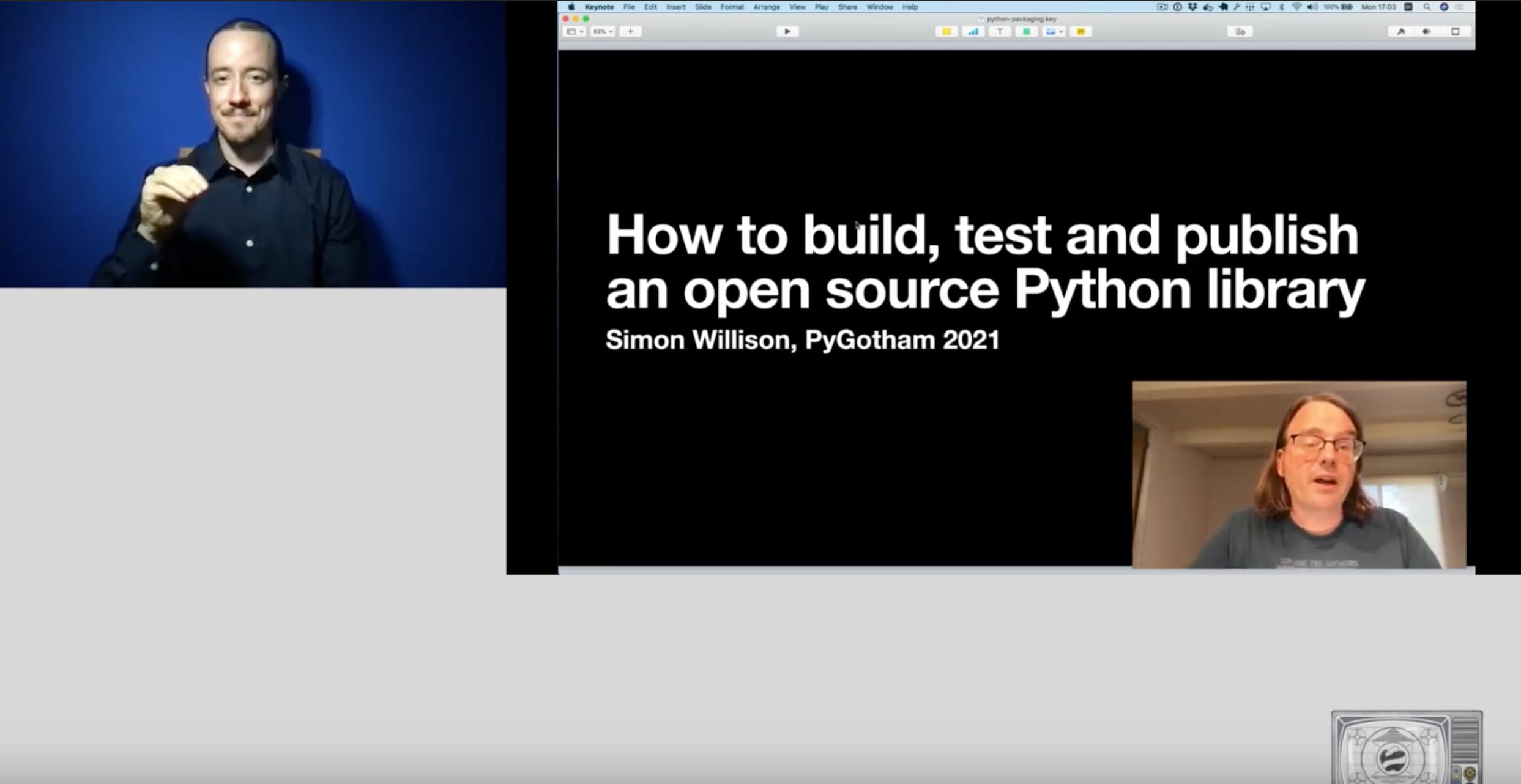42 posts tagged “pypi”
2026
Distributing Go binaries like sqlite-scanner through PyPI using go-to-wheel
I’ve been exploring Go for building small, fast and self-contained binary applications recently. I’m enjoying how there’s generally one obvious way to do things and the resulting code is boring and readable—and something that LLMs are very competent at writing. The one catch is distribution, but it turns out publishing Go binaries to PyPI means any Go binary can be just a uvx package-name call away.
ChatGPT Containers can now run bash, pip/npm install packages, and download files
One of my favourite features of ChatGPT is its ability to write and execute code in a container. This feature launched as ChatGPT Code Interpreter nearly three years ago, was half-heartedly rebranded to “Advanced Data Analysis” at some point and is generally really difficult to find detailed documentation about. Case in point: it appears to have had a massive upgrade at some point in the past few months, and I can’t find documentation about the new capabilities anywhere!
[... 3,019 words]2025
PyPI: Preventing Domain Resurrection Attacks (via) Domain resurrection attacks are a nasty vulnerability in systems that use email verification to allow people to recover their accounts. If somebody lets their domain name expire an attacker might snap it up and use it to gain access to their accounts - which can turn into a package supply chain attack if they had an account on something like the Python Package Index.
PyPI now protects against these by treating an email address as not-validated if the associated domain expires.
Since early June 2025, PyPI has unverified over 1,800 email addresses when their associated domains entered expiration phases. This isn't a perfect solution, but it closes off a significant attack vector where the majority of interactions would appear completely legitimate.
This attack is not theoretical: it happened to the ctx package on PyPI back in May 2022.
Here's the pull request from April in which Mike Fiedler landed an integration which hits an API provided by Fastly's Domainr, followed by this PR which polls for domain status on any email domain that hasn't been checked in the past 30 days.
Introducing OSS Rebuild: Open Source, Rebuilt to Last (via) Major news on the Reproducible Builds front: the Google Security team have announced OSS Rebuild, their project to provide build attestations for open source packages released through the NPM, PyPI and Crates ecosystom (and more to come).
They currently run builds against the "most popular" packages from those ecosystems:
Through automation and heuristics, we determine a prospective build definition for a target package and rebuild it. We semantically compare the result with the existing upstream artifact, normalizing each one to remove instabilities that cause bit-for-bit comparisons to fail (e.g. archive compression). Once we reproduce the package, we publish the build definition and outcome via SLSA Provenance. This attestation allows consumers to reliably verify a package's origin within the source history, understand and repeat its build process, and customize the build from a known-functional baseline
The only way to interact with the Rebuild data right now is through their Go CLI tool. I reverse-engineered it using Gemini 2.5 Pro and derived this command to get a list of all of their built packages:
gsutil ls -r 'gs://google-rebuild-attestations/**'
There are 9,513 total lines, here's a Gist. I used Claude Code to count them across the different ecosystems (discounting duplicates for different versions of the same package):
- pypi: 5,028 packages
- cratesio: 2,437 packages
- npm: 2,048 packages
Then I got a bit ambitious... since the files themselves are hosted in a Google Cloud Bucket, could I run my own web app somewhere on storage.googleapis.com that could use fetch() to retrieve that data, working around the lack of open CORS headers?
I got Claude Code to try that for me (I didn't want to have to figure out how to create a bucket and configure it for web access just for this one experiment) and it built and then deployed https://storage.googleapis.com/rebuild-ui/index.html, which did indeed work!
![Screenshot of Google Rebuild Explorer interface showing a search box with placeholder text "Type to search packages (e.g., 'adler', 'python-slugify')..." under "Search rebuild attestations:", a loading file path "pypi/accelerate/0.21.0/accelerate-0.21.0-py3-none-any.whl/rebuild.intoto.jsonl", and Object 1 containing JSON with "payloadType": "in-toto.io Statement v1 URL", "payload": "...", "signatures": [{"keyid": "Google Cloud KMS signing key URL", "sig": "..."}]](https://static.simonwillison.net/static/2025/rebuild-ui.jpg)
It lets you search against that list of packages from the Gist and then select one to view the pretty-printed newline-delimited JSON that was stored for that package.
The output isn't as interesting as I was expecting, but it was fun demonstrating that it's possible to build and deploy web apps to Google Cloud that can then make fetch() requests to other public buckets.
Hopefully the OSS Rebuild team will add a web UI to their project at some point in the future.
crates.io: Trusted Publishing (via) crates.io is the Rust ecosystem's equivalent of PyPI. Inspired by PyPI's GitHub integration (see my TIL, I use this for dozens of my packages now) they've added a similar feature:
Trusted Publishing eliminates the need for GitHub Actions secrets when publishing crates from your CI/CD pipeline. Instead of managing API tokens, you can now configure which GitHub repository you trust directly on crates.io.
They're missing one feature that PyPI has: on PyPI you can create a "pending publisher" for your first release. crates.io currently requires the first release to be manual:
To get started with Trusted Publishing, you'll need to publish your first release manually. After that, you can set up trusted publishing for future releases.
My First Open Source AI Generated Library (via) Armin Ronacher had Claude and Claude Code do almost all of the work in building, testing, packaging and publishing a new Python library based on his design:
- It wrote ~1100 lines of code for the parser
- It wrote ~1000 lines of tests
- It configured the entire Python package, CI, PyPI publishing
- Generated a README, drafted a changelog, designed a logo, made it theme-aware
- Did multiple refactorings to make me happier
The project? sloppy-xml-py, a lax XML parser (and violation of everything the XML Working Group hold sacred) which ironically is necessary because LLMs themselves frequently output "XML" that includes validation errors.
Claude's SVG logo design is actually pretty decent, turns out it can draw more than just bad pelicans!
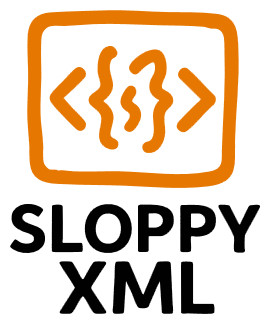
I think experiments like this are a really valuable way to explore the capabilities of these models. Armin's conclusion:
This was an experiment to see how far I could get with minimal manual effort, and to unstick myself from an annoying blocker. The result is good enough for my immediate use case and I also felt good enough to publish it to PyPI in case someone else has the same problem.
Treat it as a curious side project which says more about what's possible today than what's necessarily advisable.
I'd like to present a slightly different conclusion here. The most interesting thing about this project is that the code is good.
My criteria for good code these days is the following:
- Solves a defined problem, well enough that I'm not tempted to solve it in a different way
- Uses minimal dependencies
- Clear and easy to understand
- Well tested, with tests prove that the code does what it's meant to do
- Comprehensive documentation
- Packaged and published in a way that makes it convenient for me to use
- Designed to be easy to maintain and make changes in the future
sloppy-xml-py fits all of those criteria. It's useful, well defined, the code is readable with just about the right level of comments, everything is tested, the documentation explains everything I need to know, and it's been shipped to PyPI.
I'd be proud to have written this myself.
This example is not an argument for replacing programmers with LLMs. The code is good because Armin is an expert programmer who stayed in full control throughout the process. As I wrote the other day, a skilled individual with both deep domain understanding and deep understanding of the capabilities of the agent.
astral-sh/ty (via) Astral have been working on this "extremely fast Python type checker and language server, written in Rust" quietly but in-the-open for a while now. Here's the first alpha public release - albeit not yet announced - as ty on PyPI (nice donated two-letter name!)
You can try it out via uvx like this - run the command in a folder full of Python code and see what comes back:
uvx ty check
I got zero errors for my recent, simple condense-json library and a ton of errors for my more mature sqlite-utils library - output here.
It really is fast:
cd /tmp
git clone https://github.com/simonw/sqlite-utils
cd sqlite-utils
time uvx ty check
Reports it running in around a tenth of a second (0.109 total wall time) using multiple CPU cores:
uvx ty check 0.18s user 0.07s system 228% cpu 0.109 total
Running time uvx mypy . in the same folder (both after first ensuring the underlying tools had been cached) took around 7x longer:
uvx mypy . 0.46s user 0.09s system 74% cpu 0.740 total
This isn't a fair comparison yet as ty still isn't feature complete in comparison to mypy.
Making PyPI’s test suite 81% faster (via) Fantastic collection of tips from Alexis Challande on speeding up a Python CI workflow.
I've used pytest-xdist to run tests in parallel (across multiple cores) before, but the following tips were new to me:
COVERAGE_CORE=sysmon pytest --cov=myprojecttells coverage.py on Python 3.12 and higher to use the new sys.monitoring mechanism, which knocked their test execution time down from 58s to 27s.- Setting
testpaths = ["tests/"]inpytest.iniletspytestskip scanning other folders when trying to find tests. python -X importtime ...shows a trace of exactly how long every package took to import. I could have done with this last week when I was trying to debug slow LLM startup time which turned out to be caused be heavy imports.
Using pip to install a Large Language Model that’s under 100MB
I just released llm-smollm2, a new plugin for LLM that bundles a quantized copy of the SmolLM2-135M-Instruct LLM inside of the Python package.
[... 1,553 words]llm-anthropic.
I've renamed my llm-claude-3 plugin to llm-anthropic, on the basis that Claude 4 will probably happen at some point so this is a better name for the plugin.
If you're a previous user of llm-claude-3 you can upgrade to the new plugin like this:
llm install -U llm-claude-3
This should remove the old plugin and install the new one, because the latest llm-claude-3 depends on llm-anthropic. Just installing llm-anthropic may leave you with both plugins installed at once.
There is one extra manual step you'll need to take during this upgrade: creating a new anthropic stored key with the same API token you previously stored under claude. You can do that like so:
llm keys set anthropic --value "$(llm keys get claude)"
I released llm-anthropic 0.12 yesterday with new features not previously included in llm-claude-3:
- Support for Claude's prefill feature, using the new
-o prefill '{'option and the accompanying-o hide_prefill 1option to prevent the prefill from being included in the output text. #2- New
-o stop_sequences '```'option for specifying one or more stop sequences. To specify multiple stop sequences pass a JSON array of strings :-o stop_sequences '["end", "stop"].- Model options are now documented in the README.
If you install or upgrade llm-claude-3 you will now get llm-anthropic instead, thanks to a tiny package on PyPI which depends on the new plugin name. I created that with my pypi-rename cookiecutter template.
Here's the issue for the rename. I archived the llm-claude-3 repository on GitHub, and got to use the brand new PyPI archiving feature to archive the llm-claude-3 project on PyPI as well.
PyPI now supports project archival. Neat new PyPI feature, similar to GitHub's archiving repositories feature. You can now mark a PyPI project as "archived", making it clear that no new releases are planned (though you can switch back out of that mode later if you need to).
I like the sound of these future plans around this topic:
Project archival is the first step in a larger project, aimed at improving the lifecycle of projects on PyPI. That project includes evaluating additional project statuses (things like "deprecated" and "unmaintained"), as well as changes to PyPI's public APIs that will enable clients to retrieve and act on project status information. You can track our progress on these fronts by following along with warehouse#16844!
2024
Security means securing people where they are (via) William Woodruff is an Engineering Director at Trail of Bits who worked on the recent PyPI digital attestations project.
That feature is based around open standards but launched with an implementation against GitHub, which resulted in push back (and even some conspiracy theories) that PyPI were deliberately favoring GitHub over other platforms.
William argues here for pragmatism over ideology:
Being serious about security at scale means meeting users where they are. In practice, this means deciding how to divide a limited pool of engineering resources such that the largest demographic of users benefits from a security initiative. This results in a fundamental bias towards institutional and pre-existing services, since the average user belongs to these institutional services and does not personally particularly care about security. Participants in open source can and should work to counteract this institutional bias, but doing so as a matter of ideological purity undermines our shared security interests.
PyPI now supports digital attestations (via) Dustin Ingram:
PyPI package maintainers can now publish signed digital attestations when publishing, in order to further increase trust in the supply-chain security of their projects. Additionally, a new API is available for consumers and installers to verify published attestations.
This has been in the works for a while, and is another component of PyPI's approach to supply chain security for Python packaging - see PEP 740 – Index support for digital attestations for all of the underlying details.
A key problem this solves is cryptographically linking packages published on PyPI to the exact source code that was used to build those packages. In the absence of this feature there are no guarantees that the .tar.gz or .whl file you download from PyPI hasn't been tampered with (to add malware, for example) in a way that's not visible in the published source code.
These new attestations provide a mechanism for proving that a known, trustworthy build system was used to generate and publish the package, starting with its source code on GitHub.
The good news is that if you're using the PyPI Trusted Publishers mechanism in GitHub Actions to publish packages, you're already using this new system. I wrote about that system in January: Publish Python packages to PyPI with a python-lib cookiecutter template and GitHub Actions - and hundreds of my own PyPI packages are already using that system, thanks to my various cookiecutter templates.
Trail of Bits helped build this feature, and provide extra background about it on their own blog in Attestations: A new generation of signatures on PyPI:
As of October 29, attestations are the default for anyone using Trusted Publishing via the PyPA publishing action for GitHub. That means roughly 20,000 packages can now attest to their provenance by default, with no changes needed.
They also built Are we PEP 740 yet? (key implementation here) to track the rollout of attestations across the 360 most downloaded packages from PyPI. It works by hitting URLs such as https://pypi.org/simple/pydantic/ with a Accept: application/vnd.pypi.simple.v1+json header - here's the JSON that returns.
I published an alpha package using Trusted Publishers last night and the files for that release are showing the new provenance information already:
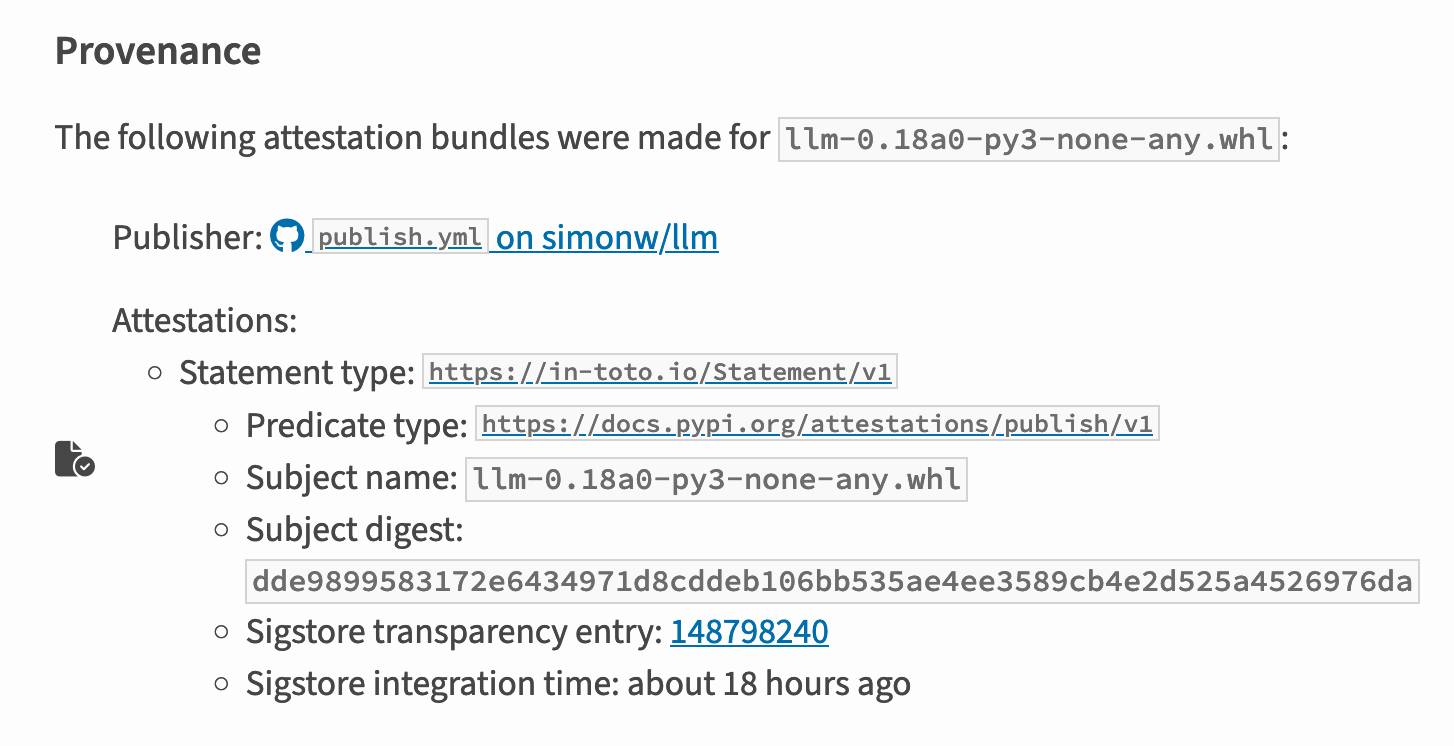
Which links to this Sigstore log entry with more details, including the Git hash that was used to build the package:
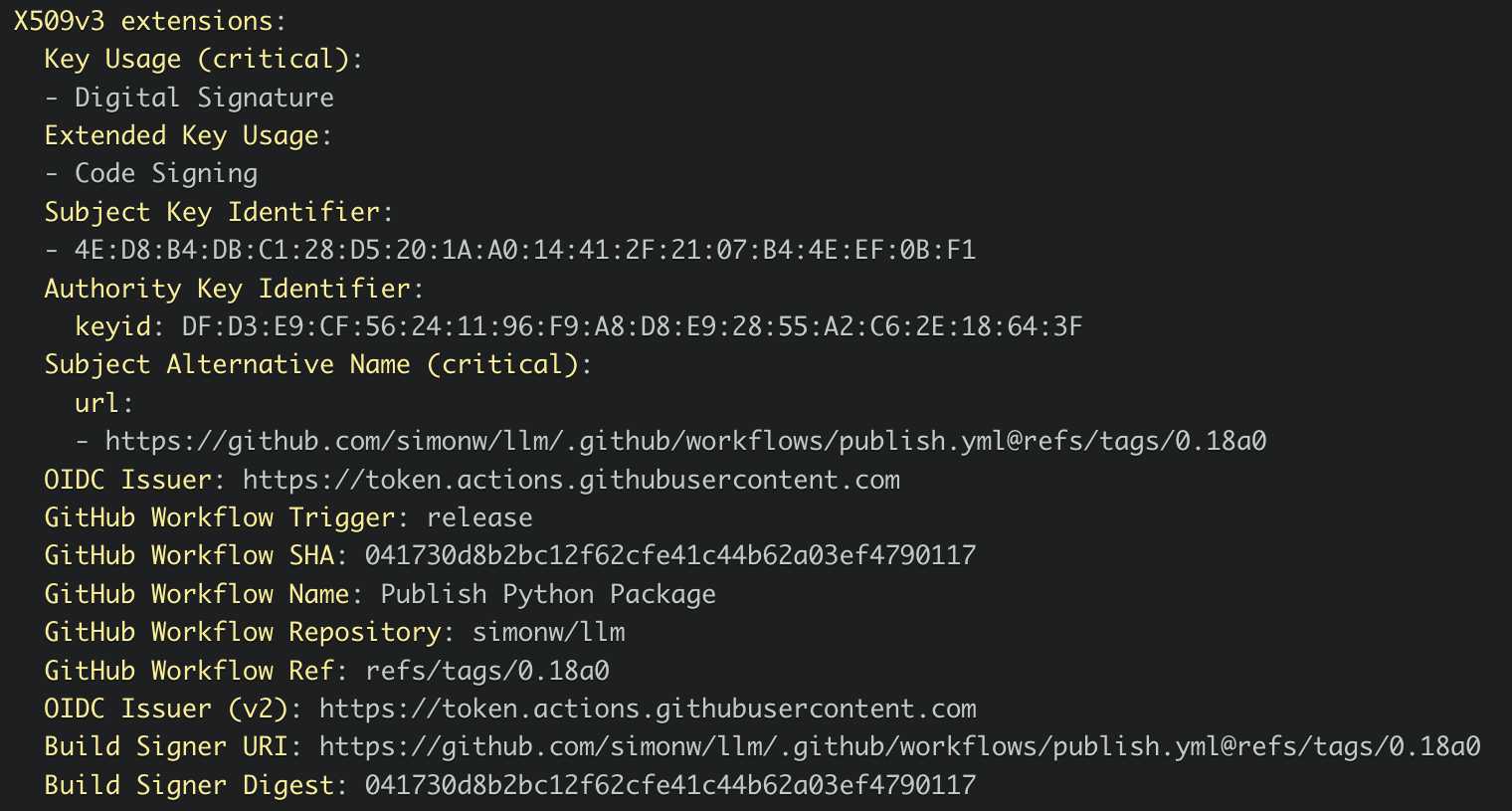
Sigstore is a transparency log maintained by Open Source Security Foundation (OpenSSF), a sub-project of the Linux Foundation.
Things I’ve learned serving on the board of the Python Software Foundation
Two years ago I was elected to the board of directors for the Python Software Foundation—the PSF. I recently returned from the annual PSF board retreat (this one was in Lisbon, Portugal) and this feels like a good opportunity to write up some of the things I’ve learned along the way.
[... 2,702 words]cibuildwheel 2.20.0 now builds Python 3.13 wheels by default (via)
CPython 3.13 wheels are now built by default […] This release includes CPython 3.13.0rc1, which is guaranteed to be ABI compatible with the final release.
cibuildwheel is an underrated but crucial piece of the overall Python ecosystem.
Python wheel packages that include binary compiled components - packages with C extensions for example - need to be built multiple times, once for each combination of Python version, operating system and architecture.
A package like Adam Johnson’s time-machine - which bundles a 500 line C extension - can end up with 55 different wheel files with names like time_machine-2.15.0-cp313-cp313-win_arm64.whl and time_machine-2.15.0-cp38-cp38-musllinux_1_2_x86_64.whl.
Without these wheels, anyone who runs pip install time-machine will need to have a working C compiler toolchain on their machine for the command to work.
cibuildwheel solves the problem of building all of those wheels for all of those different platforms on the CI provider of your choice. Adam is using it in GitHub Actions for time-machine, and his .github/workflows/build.yml file neatly demonstrates how concise the configuration can be once you figure out how to use it.
The first release candidate of Python 3.13 hit its target release date of August 1st, and the final version looks on schedule for release on the 1st of October. Since this rc should be binary compatible with the final build now is the time to start shipping those wheels to PyPI.
pip install GPT (via) I've been uploading wheel files to ChatGPT in order to install them into Code Interpreter for a while now. Nico Ritschel built a better way: this GPT can download wheels directly from PyPI and then install them.
I didn't think this was possible, since Code Interpreter is blocked from making outbound network requests.
Nico's trick uses a new-to-me feature of GPT Actions: you can return up to ten files from an action call and ChatGPT will download those files to the same disk volume that Code Interpreter can access.
Nico wired up a Val Town endpoint that can divide a PyPI wheel into multiple 9.5MB files (if necessary) to fit the file size limit for files returned to a GPT, then uses prompts to tell ChatGPT to combine the resulting files and treat them as installable wheels.
PSF announces a new five year commitment from Fastly. Fastly have been donating CDN resources to Python—most notably to the PyPI package index—for ten years now.
The PSF just announced at PyCon US that Fastly have agreed to a new five year commitment. This is a really big deal, because it addresses the strategic risk of having a key sponsor like this who might change their support policy based on unexpected future conditions.
Thanks, Fastly. Very much appreciated!
Interesting ideas in Observable Framework
Mike Bostock, Announcing: Observable Framework:
[... 2,123 words]datasette-studio. I've been thinking for a while that it might be interesting to have a version of Datasette that comes bundled with a set of useful plugins, aimed at expanding Datasette's default functionality to cover things like importing data and editing schemas.
This morning I built the very first experimental preview of what that could look like. Install it using pipx:
pipx install datasette-studio
I recommend pipx because it will ensure datasette-studio gets its own isolated environment, independent of any other Datasette installations you might have.
Now running datasette-studio instead of datasette will get you the version with the bundled plugins.
The implementation of this is fun - it's a single pyproject.toml file defining the dependencies and setting up the datasette-studio CLI hook, which is enough to provide the full set of functionality.
Is this a good idea? I don't know yet, but it's certainly an interesting initial experiment.
Publish Python packages to PyPI with a python-lib cookiecutter template and GitHub Actions
I use cookiecutter to start almost all of my Python projects. It helps me quickly generate a skeleton of a project with my preferred directory structure and configured tools.
[... 686 words]2023
bpy—Blender on PyPI (via) TIL you can “pip install” Blender!
bpy “provides Blender as a Python module”—it’s part of the official Blender project, and ships with binary wheels ranging in size from 168MB to 319MB depending on your platform.
It only supports the version of Python used by the current Blender release though—right now that’s Python 3.10.
Rye.
Armin Ronacher's take on a Python packaging tool. There are a lot of interesting ideas in this one - it's written in Rust, configured using pyproject.toml and has some very strong opinions, including completely hiding pip from view and insisting you use rye add package instead. Notably, it doesn't use the system Python at all: instead, it downloads a pre-compiled standalone Python from Gregory Szorc's python-build-standalone project - the same approach I used for the Datasette Desktop Electron app.
Armin warns that this is just an exploration, with no guarantees of future maintenance - and even has an issue open titled Should Rye exist?
Introducing PyPI Organizations. Launched at PyCon US today: Organizations allow packages on the Python Package Index to be owned by a group, not an individual user account. “We’re making organizations available to community projects for free, forever, and to corporate projects for a small fee.”—this is the first revenue generating PyPI feature.
2022
APSW is now available on PyPI. News I missed from June: the venerable (17+ years old) APSW SQLite library for Python is now officially available on PyPI as a set of wheels, built using cibuildwheel. This is a really big deal: APSW is an extremely well maintained library which exposes way more low-level SQLite functionality than the standard library’s sqlite3 module, and to-date one of the only disadvantages of using it was the need to install it independently of PyPI. Now you can just run “pip install apsw”.
Should You Use Upper Bound Version Constraints?
(via)
Should you pin your library's dependencies using "click>=7,<8" or "click~=7.0"? Henry Schreiner's short answer is no, and his long answer is an exhaustive essay covering every conceivable aspect of this thorny Python packaging problem.
Plugin support for Datasette Lite
I’ve added a new feature to Datasette Lite, my distribution of Datasette that runs entirely in the browser using Python and SQLite compiled to WebAssembly. You can now install additional Datasette plugins by passing them in the URL.
[... 865 words]sethmlarson/pypi-data (via) Seth Michael Larson uses GitHub releases to publish a ~325MB (gzipped to ~95MB) SQLite database on a roughly monthly basis that contains records of 370,000+ PyPI packages plus their OpenSSF score card metrics. It’s a really interesting dataset, but also a neat way of packaging and distributing data—the scripts Seth uses to generate the database file are included in the repository.
Bundling binary tools in Python wheels
I spotted a new (to me) pattern which I think is pretty interesting: projects are bundling compiled binary applications as part of their Python packaging wheels. I think it’s really neat.
[... 903 words]Pillar Point Stewards, pypi-to-sqlite, improvements to shot-scraper and appreciating datasette-dashboards
This week I helped Natalie launch the Pillar Point Stewards website and built a new tool for loading PyPI package data into SQLite, in order to help promote the excellent datasette-dashboards plugin by Romain Clement.
[... 1,985 words]2021
How to build, test and publish an open source Python library
At PyGotham this year I presented a ten minute workshop on how to package up a new open source Python library and publish it to the Python Package Index. Here is the video and accompanying notes, which should make sense even without watching the talk.
[... 2,055 words]